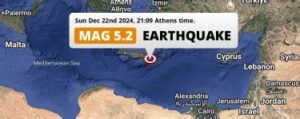📍 Epicenter and Magnitude

In the early hours of May 14, 2025, a significant earthquake struck near the Greek island of Crete. The tremor registered a magnitude between 5.9 and 6.3, with its epicenter located near the islands of Kasos and Karpathos in the Aegean Sea. The quake occurred at a depth of approximately 35 to 62.5 kilometers, according to the Athens Geodynamic Institute. The Sun+3euronews+3The Independent+3Wikipedia+4The Times+4The Sun+4
🌊 Tsunami Warning and Immediate Response

Following the earthquake, Greece’s Ministry for Climate Crisis and Civil Protection issued a temporary tsunami warning for the affected regions, including the east coast of Crete, Rhodes, Karpathos, and Kasos. Residents and tourists were advised to move away from coastal areas and seek higher ground as a precautionary measure. Time Out Worldwide+6euronews+6The Times+6
🏝️ Impact on Local Areas
Despite the strength of the earthquake, there have been no reports of significant property damage or casualties. However, as a safety measure, popular tourist sites such as the Samaria Gorge in Crete have been temporarily closed to assess potential rockfalls or other hazards. The Times+1NationalWorld+1euronews
✈️ Travel Advisories and Flight Operations
As of now, no foreign governments, including the UK Foreign Office, have issued travel advisories against visiting Greece or its islands. Flights to and from Crete are operating normally. Travelers are encouraged to stay updated with their airlines and tour operators for any changes. euronews+1Time Out Worldwide+1The Independent+3Time Out Worldwide+3NationalWorld+3The Times
🛡️ Travel Insurance and Refund Policies

In the absence of official travel advisories, standard package travel regulations may not guarantee refunds for cancellations. However, travelers with comprehensive insurance policies that cover natural disasters may be eligible for compensation. It’s advisable to review your policy details and consult with your insurance provider. The Times+1NationalWorld+1euronews+1The Times+1
🌐 Regional Seismic Activity
Greece is situated on the boundary between the African and Eurasian tectonic plates, making it one of Europe’s most seismically active regions. Earlier this year, the Santorini-Amorgos area experienced over 7,700 tremors, highlighting the country’s susceptibility to earthquakes. The Irish Sun+3Time Out Worldwide+3The Independent+3The Sun+3The Irish Sun+3The Sun+3
🧭 Safety Recommendations for Travelers
-
Stay Informed: Regularly check updates from local authorities and official channels.
-
Emergency Contacts: Familiarize yourself with local emergency numbers and procedures.
-
Avoid Coastal Areas: Heed warnings and stay away from beaches during alerts.
-
Travel Insurance: Ensure your policy covers natural disasters and understand the claim process.Time Out Worldwideeuronews+2The Times+2The Independent+2
🧳 Final Thoughts
While the recent earthquake in Crete has raised concerns, the prompt response from authorities and the lack of significant damage suggest that the situation is under control. Travelers should remain vigilant, stay informed, and follow official guidance to ensure their safety during their visit to the region.



Leave a Reply